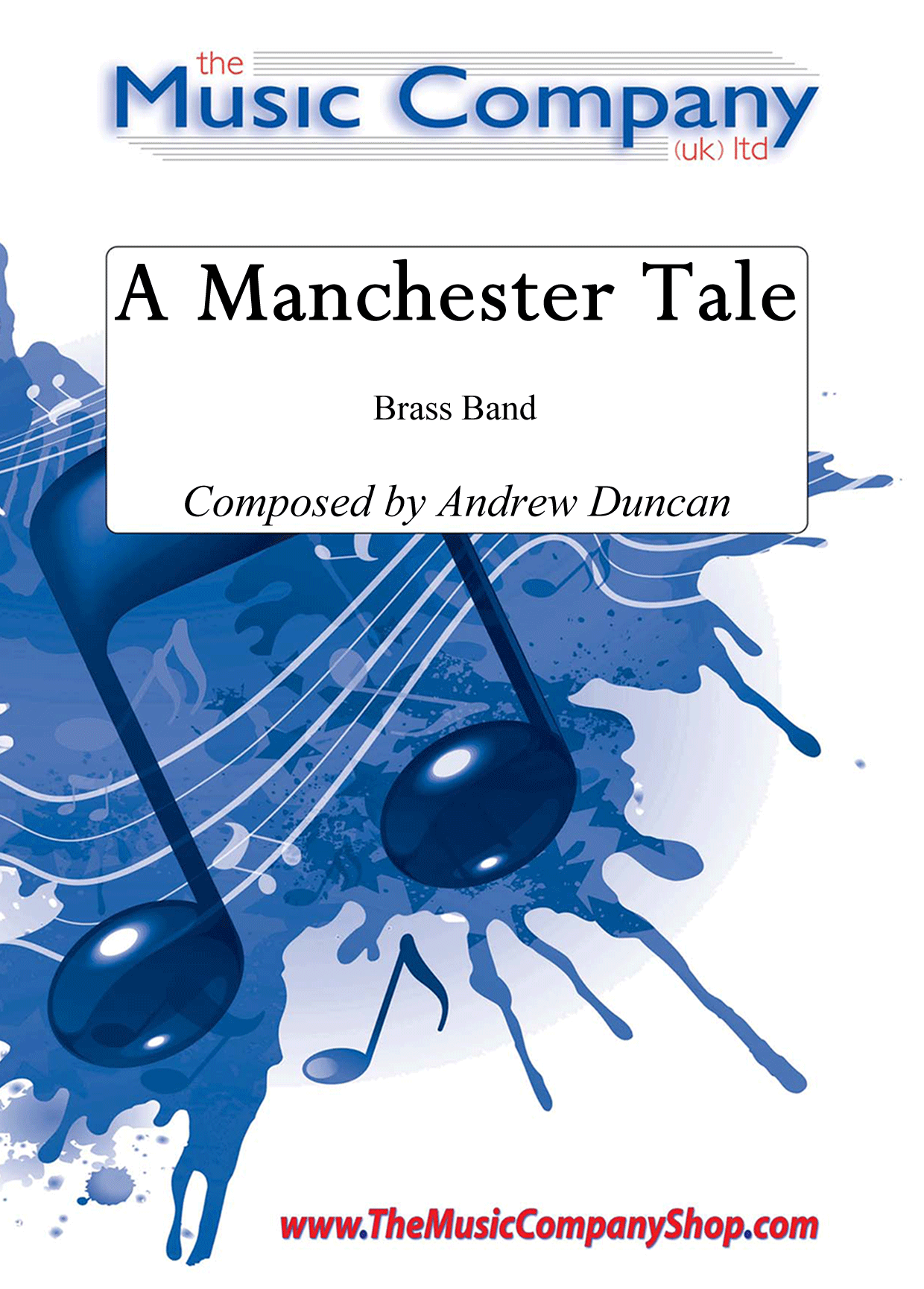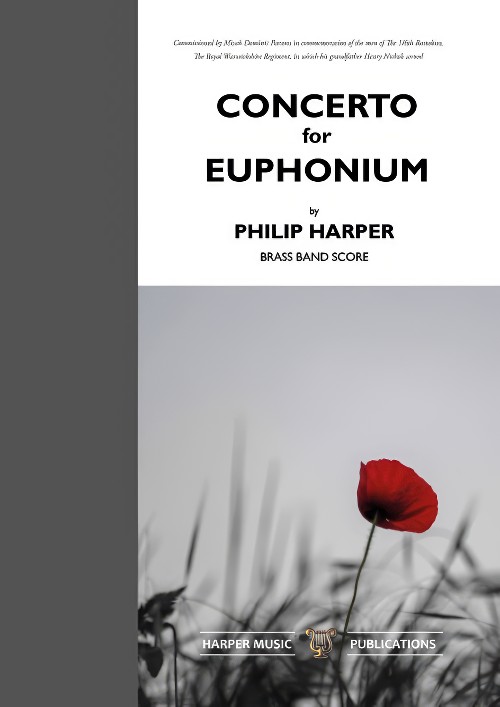Results
-
 £32.95
£32.95SUNSHINE OF YOUR SMILE (Brass Band) - Ray, Lilian - Bryce, Frank
Brass Band Set (inc. Solo Cornet Conductor). The Sunshine of Your Smile was a British popular song published in London in 1913 just before the First World War.
Estimated dispatch 7-14 working days
-
 £59.99
£59.99Bofors To The Fore Joseph Knight
This piece was a commission to commemorate the memory of Gunner A. E. Collins who during the second world war was engaged in an action where during an advance through Belgium heavy resistance was met and he and an officer had to cover a retreat using Bofors guns. In the final report the title of this piece was actually used by the commanding officer.The piece its self is in three movements and follows the flow of the battle. The first movement called "Advance" is cautious and has the hint of battle. It starts quietly and then builds up slowly and finishes unresolved. Movement two "Engagement" starts suddenly in 7/8 and uses cyclical rhythms and clustered chords to show the horror and chaos of battle and also the firing the Bofors guns. The third movement "Safe Return" brings all of the themes from the first two movements and finishes with "The End Of The Day". The commission stated that bugle calls and "The End Of The Day" should be included.The piece is suitable for a concert work or indeed the contest stage.J Knight 2022.
Estimated dispatch 5-9 working days
-
 £29.99
£29.99The Oak Leaf - Concert March By Joseph Knight
This is a commission from the family of Gunner A E Collins, who received a bronze oak leaf and the Belgium Croix De Guerre for his actions during World War 2. The piece is a march in the style of the military marches of Ron Goodwin and Elmer Bernstein.
Estimated dispatch 5-9 working days
-
 £35.00
£35.00A Manchester Tale - Andrew Duncan
This stunning piece depicts life in the City of Manchester in the years surrounding the Second World War and the effect these years had on the citizens of Manchester. It's a striking work, with creativity and colour, overflowing with emotion and atmosphere. For maximum effect, it even includes an optional part for a wartime siren which announces the start of an air raid attack.Winner of 'Best New Work' at Spennymore Brass Band Contest in 2000 (played by the Grimethorpe Colliery Band conducted by Garry Cutt), and featured on the Sellers Band CD, Celtic Connections.Look and Listen (performance courtesy of RNCM Brass Band at Unibrass 2018):
In Stock: Estimated dispatch 3-5 working days
-
 £154.99
£154.99Concerto for Euphonium - Philip Harper
This Concerto for Euphonium casts the euphonium soloist as one of the young soldiers in a World War I battalion for an intensely intimate and visceral experience of events. However the music also portrays a more general human journey, and will appeal on a number of levels. There are three movements which have the following subtitles: I - Summer 1916 - Days of YouthII - Winter 1916 - The Weight of MaturityIII - 4th February 1917 - ReleaseAlthough challenging, the solo part is designed to be achievable by all ambitious euphonium soloists.
Estimated dispatch 5-14 working days
-
 £149.95
£149.95Concerto for Euphonium (Euphonium Solo with Brass Band - Score and Parts) - Harper, Philip
This Concerto for Euphonium casts the euphonium soloist as one of the young soldiers in a World War I battalion for an intensely intimate and visceral experience of events. However the music also portrays a more general human journey, and will appeal on a number of levels.There are three movements which have the following subtitles:Summer 1916 - Days of YouthWinter 1916 - The Weight of Maturity4th February 1917 - ReleaseAlthough challenging, the solo part is designed to be achievable by all ambitious euphonium soloists.Duration: 19.00
Estimated dispatch 7-14 working days
-
£29.95
Anthem Of The Free (Brass Band - Score and Parts) - Goffin, Dean
Prior to becoming a Salvation Army officer, Dean Goffin was the first Salvationist composer to gain a degree in music composition. This march was originally written for the 4th Brigade Band of the New Zealand Armed Forces (which Goffin conducted during World War Two) and called Bel Hamid before being adapted for Salvation Army use. The march contains the gospel song Ring the bells of heaven (...pealing forth the anthem of the free).
Estimated dispatch 7-14 working days
-
£14.95
Anthem Of The Free (Brass Band - Score only) - Goffin, Dean
Prior to becoming a Salvation Army officer, Dean Goffin was the first Salvationist composer to gain a degree in music composition. This march was originally written for the 4th Brigade Band of the New Zealand Armed Forces (which Goffin conducted during World War Two) and called Bel Hamid before being adapted for Salvation Army use. The march contains the gospel song Ring the bells of heaven (...pealing forth the anthem of the free).
Estimated dispatch 7-14 working days
-
 £30.00
£30.00My Little Welsh Home - Traditional
A beautiful arrangement by Tim Paton of a Welsh song by W S Gwynne Williams. Created in memory of his mother, Tim has produced a wonderful version for brass band and has also included an optional vocal solo or unison choir line.Comments from the arranger:I have arranged [My Little Welsh Home] in memory of my mother. [She] was born, Doreen Davies, on 27th November 1918, in Haverfordwest, Pembrokeshire, a small town in South West Wales. She had a beautiful voice, and met my father, Bill Paton, during World War II, whilst she was singing in a troop concert at the County Theatre in her home town, and my father was the MC.Throughout her life, my mother and father entertained, and she was singing right up until the final months of her life. She spent many years in Weston-super-Mare, Somerset, a seaside town in South West England, and it was here that she passed away on 20th September 2004. During the last several months of her life, she often referred to the song My Little Welsh Home:Here are the words.I am dreaming of the mountains of my homeOf the mountains where in childhood I would roamI have dwelt 'neath southern skiesWhere the summer never diesBut my heart is in the mountains of my homeI can see the little homestead on the hillI can hear the magic music of the RhyllThere is nothing to compareWith the love that once was thereIn the lonely little homestead on the hillI can see the quiet churchyard down belowWhere the mountain breezes wander to and froAnd when God my soul will keepIt is there I want to sleepWith those dear old folks that loved me long agoLooking at the words, I can see why it meant so much to her. Haverfordwest is at the foot of the Preseli Mountains, and her home and church were at the top of a hill. My mothers' ashes were taken back to her own little Welsh home, and laid to rest in the grounds of the church where she had been Christened, Confirmed and Married.Look and Listen (Score-reading digital sound-sample):
In Stock: Estimated dispatch 3-5 working days
-
 £30.00
£30.00Jerusalem - C. Hubert H. Parry arr. Phillip Littlemore
Sir Hubert Parry wrote the music to the hymn Jerusalem in 1916, during the gloom of World War I. It uses William Blake's poem And Did Those Feet In Ancient Times which itself was written around 1804, and first published in 1808.Parry's hymn was originally written for the 'Fight for Right' movement, formed to sustain the resolve of Britain during the Great War. The hymn received its premiere on the 28th March 1916 in the Queen's Hall, London at a 'Fight for Right' meeting. In 1917, Parry conducted it for the ladies of the Albert Hall choir as part of a call in favour of National Service for Women. This signalled a closer relationship with the women's suffrage movement which Parry and his wife, Maude, supported. A year later, Jerusalem was sung at a suffrage demonstration concert and was adopted by the Women's' Institute as their anthem in 1924.There are regular calls for the hymn to be adopted as the official National Anthem of England, but this is not new. The first such call can be traced back to the centenary of Blake's death in 1927 and the call continues undimmed to this present day. This brass band arrangement is based on Parry's original orchestration from 1916.Duration: 2'20"Difficulty: Suitable for all grades
Estimated dispatch 5-7 working days
